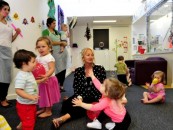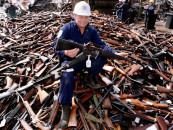Earlier this year, ‘Reclaim Australia’ and various counter-protests were in the news as people hurled abuse at each other and engaged in punch-ups. And since both sides had a fair sprinkling of the great unwashed, we all got to admire some unfamiliar tattoos and body piercings.
Much of the outrage by ‘Reclaim Australia’ concerned halal certification, about which my office has been bombarded with emails. Many are from people who do not appreciate the difference between voluntary and mandated certification schemes. Like kosher, halal certification is entirely voluntary. I would strongly object if the government got in on the act, but a voluntary scheme allows us all to choose what to buy ourselves.
But not all of Reclaim Australia’s claims are so easily dismissed. There is a problem with child marriage among some Muslims, as there is with misogyny, homophobia, and support for terrorism. However, the protestors make a dreadful mistake in viewing all Muslims as a group, represented either by violent Islamists or the conservative ‘community leaders’ that governments and the media persist in treating as spokesmen.
As others have noted, people of Muslim faith have lived in Australia since the 1800s; they only make up 2% of our population; halal certification has no measurable impact on our daily lives; and people waving Israeli flags marching side-by-side with others brandishing swastika tattoos is ‘cognitive dissonance at its best’.
And yet, Reclaim Australia’s ‘progressive’ opponents are just as guilty of cognitive dissonance. Not only did they burn the Australian flag – which isn’t illegal, but is rather unpersuasive – they engaged in more violence than those they were criticising for their, er, violence. They too sought to treat all Muslims as an amorphous mass – in this case, as uniformly benign and politically progressive.
As I see it, Australia doesn’t need ‘reclaiming’. While a bit of patriotism is fine, nationalism is little more than pride in an accident of birth. However, the concept of citizenship – particularly citizenship in a liberal democracy – does require reclaiming. Its value in Australia has been substantially diminished.
My party, the Liberal Democrats, has a policy of restricting citizenship to those who have established themselves in the community over at least ten years, who share our values of freedom and democracy, and who have demonstrated their desire to build a long-term future in Australia.
We would seek to confirm this with a citizenship test, not about historical trivia or tricky definitions, but liberal democratic values – values we share with lots of other liberal democracies. Our test would be outward-looking and our concept of citizenship cosmopolitan, exploring values such as women’s rights (particularly suffrage), free speech, freedom to divorce, freedom of association, and freedom of religion – including the right to leave a religion or have no religion at all.
In our view, prospective citizens need to accumulate an employment history rather than a criminal one. While we have a somewhat relaxed approach to permanent residence, we would restrict welfare payments to citizens (apart from genuine refugees). Indeed, that’s a conversation I hope to start via the Productivity Commission’s inquiry into our policy of using tariffs, rather than quotas, to manage Australia’s immigration intake. If we can decouple immigration from welfare, people are much more likely to appreciate its positive benefits.
Increasing the value of citizenship is not radical in the rest of the world. For example, Switzerland requires residency for 10 years, support from the canton and local area, integration into the Swiss way of life, and compliance with the rule of law. The Swiss system makes it clear that citizenship is about values, not real estate.
To the extent that religious or cultural beliefs and practices conflict with basic liberal democratic values, then it is reasonable for Australia to demand that those cultural or religious practices be given up by those who seek to become citizens. If people are to integrate into a liberal democracy, they should at least share its core values.
Australia neither needs nor wants to import illiberal values, whether from Sharia or any other value system. Indeed, we are far too accepting of those who come to Australia with its respect for liberty, only to seek to transform it into something like the illiberal, authoritarian country they left behind.
Australian citizenship is precious, and should not be granted lightly.








